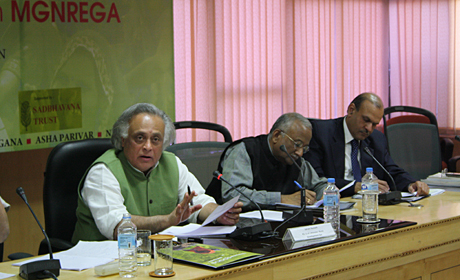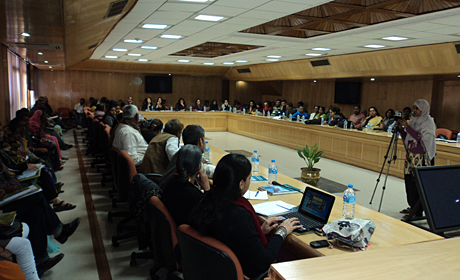Minister of Rural Development Jairam Ramesh commits to making MGNREGA more women-friendly
Date:
For immediate release
Promises to ensure that half of worksite supervisors under the world’s largest pay-for-work programme will be women
Lucknow: In a major boost for women workers, Indian Minister for Rural Development Jairam Ramesh made strong commitments to strengthen the participation of women in the Mahatma Gandhi National Rural Employment Guarantee Act (MGNREGA). “By the end of this week, I will issue a letter to all the State Governments recommending that 50 per cent of the worksite mates or supervisors at MGNREGA worksites are women,” said Shri Jairam Ramesh, Hon. Minister Rural Development, Government of India.

Minister of Rural Development Jairam Ramesh speaks at the National Consultation on Women and MGNREGA organized by Gender at Work and UN Women. Photo credit: UN Women
He was speaking at the National Consultation on Women and MGNREGA organized by Gender at Work and UN Women at Yojna Bhawan, Lucknow in the presence of activists such as Aruna Roy, Member, National Advisory Council; Jean Dreze, Honorary Professor, Delhi School of Economics and Gobind Ballabh Pant Social Sciences Institute and Nikhil Dey, Member, National Employment Guarantee Council.
MGNREGA is the world’s largest pay-for-work programme in the world and can be a critical source of employment for women. The participation of women in the MGNREGA has, however, been mixed. “Only 18 per cent of women have participated in Uttar Pradesh, in comparison almost 90 percent of women are involved in Kerala, and 80 percent in Rajasthan. The involvement of Dalit women is even lower. The low participation of women in Uttar Pradesh is unacceptable,” said Aruna Roy, Member, National Advisory Council.
The Act also placed stronger focus on households rather than the individual. “The word household had no place in an entitlement based law like NREGA. Job cards should be given separately in the name of individual men and women,” said Jean Dreze, Honorary Professor, Delhi School of Economics and Gobind Ballabh Pant Social Sciences Institute.
There was consensus that single women needed separate job-cards. “We will issue operational guidelines to the states to immediately issue separate Job Cards to all single women, whether widowed, separated or unmarried. I have also just issued an order for mandatory bank accounts to be opened promptly for all women workers at banks and post-offices,” said the Union Rural Development Minister.

Participants at the National Consultation on Women and MGNREGA. Photo credit: UN Women
Responding to demands by activists, the Government of India set clear deadlines and made definite commitments to ensuring that women will be included in the scheme:
- Strong efforts will be made to to capture demand for work
- A nation wide study will be undertaken on the gender impact of NREGA
- An annual consultation on “Women and MGNREGA” will be organized every year
- Convergence with the Ministry of Women and Child Development for construction of Aanganwadi centers under MGNREGA and expansion of child care services
- Examining whether a national rule can ensure that delays in payment can automatically compensated to the worker
Sri Rajiv Kumar, Principle Secretary, Ministry of Rural Development in UP, committed on behalf of the Government of Uttar Pradesh that by 31st March, the State would show 33 percent participation of women in NREGA.
Over 100 people who represented organizations involved in the MGNREGA from six states attended the two-day consultation. These states include Uttar Pradesh, Bihar, Rajasthan, Andhra Pradesh, Madhya Pradesh, Chhattisgarh and Gujarat.
Senior activists, government officials, and policy makers from across the country recommended the following solutions:
- Building awareness about the Act amongst women through women’s groups and movements
- Individual entitlement for women, not household-based
- Job cards for single women
- Promotion of all-women work sites
- Mandatory gender audits
- Training women as ‘mate’ supervisors
Media inquiries:
Arundhati Dhuru: 09415022772/ Madhavi Kuckreja: 9984616000/ Sabrina Sidhu: +91-9818717522, sabrina.sidhu@unwomen.org
Download photos: https://www.flickr.com/photos/unwomenasiapacific/sets/72157632150073243/with/8237323299/
Read the story: http://www.unwomensouthasia.org/2012/expanding-jobs-for-rural-women-in-india/
Peer strategy http://bit.ly/MUoWkE
Photo stories: http://bit.ly/WDl231
https://www.facebook.com/unwomenindia
https://www.twitter.com/unwomenindia